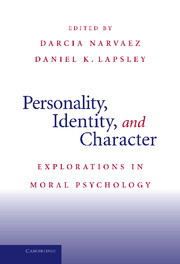Book contents
- Frontmatter
- Contents
- Contributors
- Introduction
- 1 The Moral Personality
- 2 The Moral Functioning of the Person as a Whole: On Moral Psychology and Personality Science
- 3 Moral Science? Still Metaphysical After All These Years
- 4 Cultural Pluralism and Moral Identity
- 5 Neuroscience and Morality: Moral Judgments, Sentiments, and Values
- 6 Triune Ethics Theory and Moral Personality
- 7 Early Foundations: Conscience and the Development of Moral Character
- 8 The Development of the Moral Personality
- 9 Urban Neighborhoods as Contexts for Moral Identity Development
- 10 Moral Personality Exemplified
- 11 Greatest of the Virtues? Gratitude and the Grateful Personality
- 12 The Elusive Altruist: The Psychological Study of the Altruistic Personality
- 13 Growing Toward Care: A Narrative Approach to Prosocial Moral Identity and Generativity of Personality in Emerging Adulthood
- 14 Moral Identity, Integrity, and Personal Responsibility
- 15 The Dynamic Moral Self: A Social Psychological Perspective
- 16 The Double-Edged Sword of a Moral State of Mind
- 17 Moral Identity in Business Situations: A Social-Cognitive Framework for Understanding Moral Functioning
- 18 The Moral Functioning of Mature Adults and the Possibility of Fair Moral Reasoning
- 19 Moral Personality: Themes, Questions, Futures
- Author Index
- Subject Index
4 - Cultural Pluralism and Moral Identity
Published online by Cambridge University Press: 05 June 2012
- Frontmatter
- Contents
- Contributors
- Introduction
- 1 The Moral Personality
- 2 The Moral Functioning of the Person as a Whole: On Moral Psychology and Personality Science
- 3 Moral Science? Still Metaphysical After All These Years
- 4 Cultural Pluralism and Moral Identity
- 5 Neuroscience and Morality: Moral Judgments, Sentiments, and Values
- 6 Triune Ethics Theory and Moral Personality
- 7 Early Foundations: Conscience and the Development of Moral Character
- 8 The Development of the Moral Personality
- 9 Urban Neighborhoods as Contexts for Moral Identity Development
- 10 Moral Personality Exemplified
- 11 Greatest of the Virtues? Gratitude and the Grateful Personality
- 12 The Elusive Altruist: The Psychological Study of the Altruistic Personality
- 13 Growing Toward Care: A Narrative Approach to Prosocial Moral Identity and Generativity of Personality in Emerging Adulthood
- 14 Moral Identity, Integrity, and Personal Responsibility
- 15 The Dynamic Moral Self: A Social Psychological Perspective
- 16 The Double-Edged Sword of a Moral State of Mind
- 17 Moral Identity in Business Situations: A Social-Cognitive Framework for Understanding Moral Functioning
- 18 The Moral Functioning of Mature Adults and the Possibility of Fair Moral Reasoning
- 19 Moral Personality: Themes, Questions, Futures
- Author Index
- Subject Index
Summary
Under the naturalistic theory of morality I have defended (Wong, 2006), moralities are parts of cultures. In this essay I give a brief introduction to the motivations for the theory, explain the sense in which it is relativistic, and address some of the difficulties that confront any theory that explains moralities in terms of cultures. In particular, these difficulties concern the internal diversity and contestation within cultures, as well as the fuzziness and variability of boundaries between cultures. The first section introduces the naturalistic explanation of moralities in terms of cultures. The second section surveys the ways in which difficulties for the concept of culture have been raised in recent anthropological and philosophical literature. The third section proposes a concept of culture as conversation that takes these difficulties into account. The fourth section traces implications of the concept of culture as conversation for the question of how cultures differ from one another, and for the question of the moral identity of the individual as a participant in cultural conversations. The proposed concept of culture, it will be argued, helps to defuse the problem of fuzziness and variability of boundaries between cultures, helps us to reconcile the autonomy with the cultural embedding of moral identity, and calls into question traditional understandings of healthy and developed moral identity as possessing the properties of consistency, integration, and stability.
MORAL AMBIVALENCE AS A MOTIVATION FOR A NATURALISTIC APPROACH TO UNDERSTANDING MORALITY
Orthodox Anglophone moral philosophy assumes with very little argument that there is a single true morality, and the situation seems not much different in moral developmental psychology.
- Type
- Chapter
- Information
- Personality, Identity, and CharacterExplorations in Moral Psychology, pp. 79 - 105Publisher: Cambridge University PressPrint publication year: 2009
- 7
- Cited by



